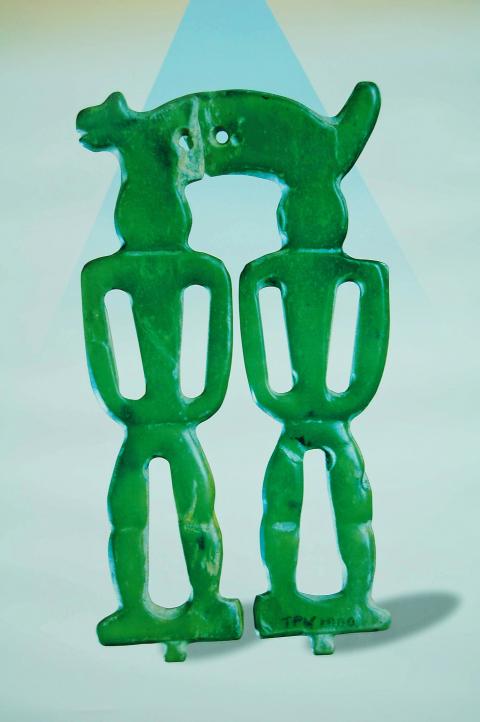David Blundell will give a lecture on Saturday titled “Taiwan roots of the Austronesian Language and Culture,” at the Legislative Yuan, sharing the stage with Democratic Progressive Party (DPP) Legislator Kolas Yotaka, who will discuss the current state of Aboriginal affairs in Taiwan.
Blundell, a professor at National Chengchi University who has been doing anthropological and archaeological research in Taiwan since the early 1980s, will discuss how the majority of Austronesian languages find their origins in Taiwan.
“It’s a history that dates back between 4,500 to 3,500 years,” Blundell told the Taipei Times, when Taiwan’s Aboriginal groups first started to travel to what is today’s Malaysia, Indonesia and the Philippines.

Photo: Huang Ming-tang, Taipei Times
“They weren’t colonists,” Blundell says, “but traders.”
Blundell, who has recently edited Taiwan Since Martial Law: Society, Culture, Politics, Economics and Austronesian Taiwan: Linguistics, History, Ethnology, Prehistory, says that the “Formosans” would trade nephrite jade, grain and pottery to southeast Asia where they would also pass on their languages.
Their languages became incubators for other languages, which Blundell numbers at around 1,200 today, all of which fall under the Austronesian family.
“If the language incubated in Indonesia, it became a different kind of language ... just as European languages became differentiated,” he says, a pattern that repeated itself throughout the region and as far as Madagascar.
Kolas told the Taipei Times through a spokesperson that she will discuss the current land rights issues facing Aborigines.
The lectures will be held at 10am in English at the Legislative Yuan complex, 1 Jinan Rd, Taipei City (台北市濟南路1號). Admission is NT$100 and includes light refreshments.
Attendees must register with Jerome Keating by 10pm tomorrow at: jkeating@ms67.hinet.net.

April 14 to April 20 In March 1947, Sising Katadrepan urged the government to drop the “high mountain people” (高山族) designation for Indigenous Taiwanese and refer to them as “Taiwan people” (台灣族). He considered the term derogatory, arguing that it made them sound like animals. The Taiwan Provincial Government agreed to stop using the term, stating that Indigenous Taiwanese suffered all sorts of discrimination and oppression under the Japanese and were forced to live in the mountains as outsiders to society. Now, under the new regime, they would be seen as equals, thus they should be henceforth

Last week, the the National Immigration Agency (NIA) told the legislature that more than 10,000 naturalized Taiwanese citizens from the People’s Republic of China (PRC) risked having their citizenship revoked if they failed to provide proof that they had renounced their Chinese household registration within the next three months. Renunciation is required under the Act Governing Relations Between the People of the Taiwan Area and the Mainland Area (臺灣地區與大陸地區人民關係條例), as amended in 2004, though it was only a legal requirement after 2000. Prior to that, it had been only an administrative requirement since the Nationality Act (國籍法) was established in

Three big changes have transformed the landscape of Taiwan’s local patronage factions: Increasing Democratic Progressive Party (DPP) involvement, rising new factions and the Chinese Nationalist Party’s (KMT) significantly weakened control. GREEN FACTIONS It is said that “south of the Zhuoshui River (濁水溪), there is no blue-green divide,” meaning that from Yunlin County south there is no difference between KMT and DPP politicians. This is not always true, but there is more than a grain of truth to it. Traditionally, DPP factions are viewed as national entities, with their primary function to secure plum positions in the party and government. This is not unusual

US President Donald Trump’s bid to take back control of the Panama Canal has put his counterpart Jose Raul Mulino in a difficult position and revived fears in the Central American country that US military bases will return. After Trump vowed to reclaim the interoceanic waterway from Chinese influence, US Defense Secretary Pete Hegseth signed an agreement with the Mulino administration last week for the US to deploy troops in areas adjacent to the canal. For more than two decades, after handing over control of the strategically vital waterway to Panama in 1999 and dismantling the bases that protected it, Washington has